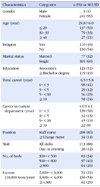Abstract
Purpose
The purpose of this study was to identify the relationship of nurses' job performance with job embeddedness, self-leadership and social support and the role of self-leadership and social support in the relation between job embeddedness and job performance among general hospital nurses.
Methods
The participants for this study were 244 nurses from 3 general hospitals in Seoul and Gyunggi Province. Data were analyzed using frequency, percentage, mean, standard deviation, t-test, ANOVA, Scheffé test, Pearson correlation and Hierarchical Multiple Regression.
Results
Job performance showed positive correlations with job embeddedness (r=.56, p<.001), self-leadership(r=.68, p<.001), organizational support (r=.30, p<.001), supervisors' support (r=.31, p<.001) and colleagues' support (r=.31, p<.001). Job embeddedness and self-leadership had significant influence on nurses' job performance. However self-leadership and social support did not show moderating effects of job embeddedness on nurses' job performance.
Conclusion
These findings indicate that job embeddednes and self-leadership are important factors to enhance nurses' job performance. Therefore, promoting activities for job embeddedness and self-leadership might be a way to increase nurses' job performance. As there was no moderating effects of self-leadership and social support on job embeddedness and job performance, further studies are necessary to refine these findings in different environments.
Figures and Tables
References
1. Yeun YR. Job stress, burnout, nursing organizational culture and turnover intention among nurses. J Korea Acad Ind Coop Soc. 2014; 15(8):4981–4986. DOI: 10.5762/KAIS.2014.15.8.4981.
2. Mitchell TR, Holtom BC, Lee TW, Sablynski CJ, Erez M. Why people stay: using job embeddedness to predict voluntary turnover. Acad Manage J. 2001; 44(6):1102–1121. DOI: 10.2307/3069391.
3. Halbesleben JRB, Wheeler AR. The relative roles of engagement and embeddedness in predicting job performance and intention to leave. Work Stress. 2008; 22(3):242–256. DOI: 10.1080/02678370802383962.
4. Lee TW, Mitchell TR, Sablynski CJ, Burton JP, Holtom BC. The effects of job embeddedness on organizational citizenship, job performance, volitional absences, and voluntary turnover. Acad Manage J. 2004; 47(5):711–722. DOI: 10.2307/20159613.
5. Sekiguchi T, Burton JP, Sablynski CJ. The role of job embeddedness on employee performance: the interactive effects with leader-member exchange and organization-based self-esteem. Pers Psychol. 2008; 61(4):761–792. DOI: 10.1111/j.1744-6570.2008.00130.x.
6. Yoon AJ. A study on organizational characteristics and efficacy on work performance: Especially hospital nursing organization [dissertation]. Daegu: Daegu University;1995.
7. Im SI, Park J, Kim HS. The effects of nurse's communication and self-leadership on nursing performance. Korean J Occup Health Nurs. 2012; 21(3):274–282. DOI: 10.5807/kjohn.2012.21.3.274.
8. Han Y, Park YR. Effects of self-leadership and job involvement on clinical competence in general hospital nurses. J Korean Acad Nurs Adm. 2013; 19(4):462–469. DOI: 10.11111/jkana.2013.19.4.462.
9. Kim YM, Yi YJ. Influence of job stress and empowerment on clinical nurse' performance in small and medium hospitals. Korean J Occup Health Nurs. 2012; 21(3):258–265. DOI: 10.5807/kjohn.2012.21.3.258.
10. Lee AS, Yoon CK, Park JK. Effects of social support and ego-resilience on nursing performance of hospital nurses. Korean J Occup Health Nurs. 2012; 21(3):283–289. DOI: 10.5807/kjohn.2012.21.3.283.
11. Neck CP, Manz CC. Thought self-leadership: The impact of mental strategies training on employee cognition, behavior, and affect. J Organ Behav. 1996; 17(5):445–467. DOI: 10.1002/(SICI)1099-1379(199609)17:5<445::AID-JOB770>3.0.CO;2-N.
12. Cohen S, Hoberman HM. Positive events and social supports as buffers of life change stress. J Appl Soc Psychol. 1983; 13(2):99–125. DOI: 10.1111/j.1559-1816.1983.tb02325.x.
13. Eisenberger R, Huntington R, Hutchison S, Sowa D. Perceived organizational support. J Appl Psychol. 1986; 71(3):500–507. DOI: 10.1037/0021-9010.71.3.500.
14. Aubé C, Rousseau V, Morin EM. Perceived organizational support and organizational commitment: The moderating effect of locus of control and work autonomy. J Manag Psychol. 2007; 22(5):479–495. DOI: 10.1108/02683940710757209.
15. Baruch-Feldman C, Brondolo E, Ben-Dayan D, Schwartz J. Sources of social support and burnout, job satisfaction, and productivity. J Occup Health Psychol. 2002; 7(1):84–93. DOI: 10.1037/1076-8998.7.1.84.
16. Mobley WH. Intermediate linkages in the relationship between job satisfaction and employee turnover. J Appl Psychol. 1977; 62(2):237–240. DOI: 10.1037/0021-9010.62.2.237.
17. Kwon JH. The effects of job resources by hotel F&B employees on job embeddedness. J Hotel Resort. 2014; 13(1):23–42.
18. Faul F, Erdfelder E, Lang AG, Buchner A. G*Power 3: A flexible statistical power analysis program for the social, behavioral, and biomedical sciences. Behav Res Methods. 2007; 39(2):175–191. DOI: 10.3758/BF03193146.
19. Ko YK, Lee TW, Lim JY. Development of a performance measurement scale for hospital nurses. J Korean Acad Nurs. 2007; 37(3):286–294.
20. Kim JH. The effects of job embeddedness on turnover intention and organizational citizenship behavior in hospital employees: Focusing on moderating effect of personality traits [dissertation]. Busan: Kyungsung University;2010.
21. Jeon JH, Yom YH. Roles of empowerment and emotional intelligence in the relationship between job embeddedness and turnover intension among general hospital nurses. J Korean Acad Nurs Adm. 2014; 20(3):302–312. DOI: 10.11111/jkana.2014.20.3.302.
22. Prussia GE, Anderson JS, Manz CC. Self-leadership and performance outcomes: The mediating influence of self-efficacy. J Organ Behav. 1998; 19(5):523–538. DOI: 10.2307/3100241.
23. Yang PS, Choi SB. The relationship among psychological capital, self-leadership and job satisfaction: The mediating effect of self-leadership. J Hum Resour Manag Res. 2011; 18(4):149–172.
24. Yoon JK, Lim JC. Organizational support in the workplace: The case of Korean hospital employees. Hum Relat. 1999; 52(7):923–945. DOI: 10.1177/001872679905200704.
25. Kim JK, Kim MJ, Kim SY, Yu M, Lee KA. Effects of general hospital nurses work environment on job embeddedness and burnout. J Korean Acad Nurs Adm. 2014; 20(1):69–81. DOI: 10.11111/jkana.2014.20.1.69.
26. Kim HS, Yim HW, Jeong SH, Jo SJ. An association among verbal abuse, social support and turnover intention for special unit nurses in a hospital. Korean J Occup Environ Med. 2009; 21(4):388–395.
27. Kim HS, Min S, Im SI. The effect of nurse's competency empowerment and boss' job competency recognition level on work performance. Korean J Occup Health Nurs. 2013; 22(2):75–82. DOI: 10.5807/kjohn.2013.22.2.75.
28. Jeong HB, Lee JY. A study on the structural relationship between teacher's self-leadership, teamwork, teaching effectiveness, work effectiveness. J Korean Teach Educ. 2012; 29(2):251–276.




 PDF
PDF ePub
ePub Citation
Citation Print
Print







 XML Download
XML Download